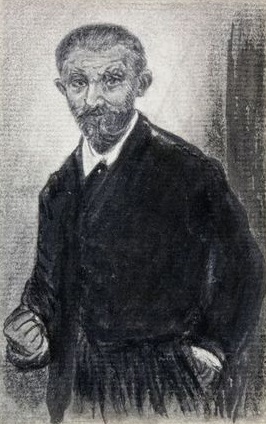Thus wrapped in thought, he found himself at his own door, without remembering the road he had taken, and as soon as he was in his room, his whole soul dilated and burst forth. He desired to thank, to call for mercy, to appeal to someone, he knew not whom, to complain of he knew not what. All at once the need of pouring himself forth, of going out of himself, took shape, and he fell on his knees saying to Our Lady,
“Have pity on me, and hear me; I would rather anything than continue this shaken existence, these idle stages without an aim. Pardon me, Holy Virgin, unclean as I am, for I have no courage for the battle. Ah, wouldest thou grant my prayer! I know well that I am over bold in daring to ask, since I am not even resolved to turn out my soul, to empty it like a bucket of filth, to strike it on the bottom, that the lees may trickle out and the scales fall off, but…but…thou knowest I am so weak, so little sure of myself, that in truth I shrink.
“Oh, all the same I would desire to flee away, a thousand miles from Paris, I know not where into a cloister. My God! Yet this is very madness that I speak, for I could not stay two days in a convent; nor indeed would they take me in.”
Then he thought—
“Though this once I am less dry, less unclean than is my wont, I can find nothing to say to Our Lady but insanities and follies, when it would be so simple to ask her pardon, to beg her to have pity on my desolate life, to aid me to resist the demands of my vices, not to pay as I do the royalties on my nerves, the tax on my senses.
“All the same,” he said, rising, “enough of this, I will at least do what little I can; without more delay I will go to the abbe tomorrow. I will explain the struggle of my soul, and we will see what happens afterwards.” —J.K. Huysmans ‘En Route’

A selction from New Advent: Catholic Encyclopedia on J.K. Huysmans
Both before and after his conversion he was a realist. All his art consisted in rendering clearly details that he had seen and noted down. His pictures of poor people, his sketches of old Paris and particularly of Bièvre, as well as his descriptions of big crowds and scenes at Lourdes, are most vivid and picturesque. Of Dutch origin, he shows in his works the temperament of a great colourist and suggests the paintings by Rembrandt and Rubens. Never did a man have clearer power of vision and never did one take more pleasure in looking and in seeing. One may therefore understand the torture that he felt when during the last days of his life he was afflicted with an affliction of the eyes and it became necessary to sew his eyelids shut. In his piety, he believed that these eyes, with which he had seen so many beautiful things and through which he had received so much pleasure, were taken from him by way of enforcing penitence.

